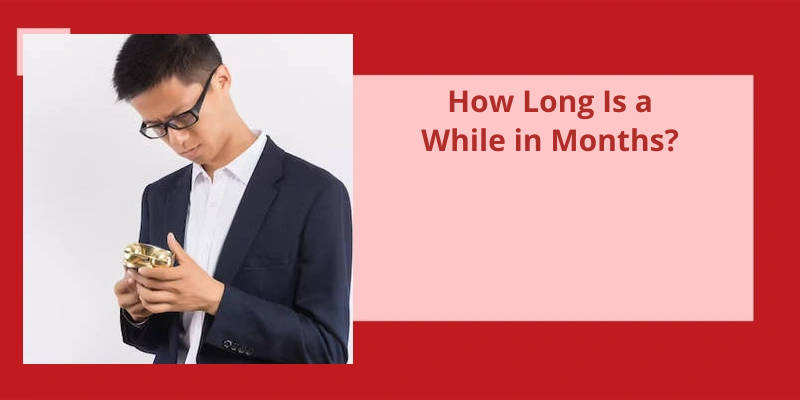Is it a few days? A couple of weeks? Months? This uncertainty can lead to confusion and miscommunication, especially when trying to make plans or set expectations. However, a recent study has shed light on this perplexing issue. According to the findings, "a while" can be estimated to be approximately 4 months in duration. On the other hand, when we say "a little while," the timeframe tends to be slightly shorter, around 3 months. But what about when we say "a while back"? This particular phrase suggests that the event or period being referred to occurred up to 8 months in the past. Understanding these subtle variations in the meaning of "a while" can prove invaluable in our daily interactions, ensuring clearer communication and avoiding any potential misunderstandings.
Is a While Long or Short Time?
Is a while long or short time? “While” by definition is a period of intermediate length, that’s usually short but longer than a minute. It’s a subjective measure that can vary depending on the context and individual perception. How long is a while precisely will depend on it’s description by adjectives as in a long while ago or a short while ago. The duration of a while is relative and can be influenced by various factors such as urgency, anticipation, and personal preference.
When someone says “a short while ago,” it usually refers to a recent event or a span of time that’s perceived to be brief. This could range from a few minutes to half an hour or so. It denotes a relative brevity, suggesting that the time elapsed is relatively insignificant.
On the other hand, when someone mentions “a long while ago,” it implies that a significant amount of time has passed since the referenced event. The duration of a long while can be more subjective and may vary depending on the context. It could refer to weeks, months, or even years, suggesting a substantial passage of time.
It’s important to note that the perception of time can vary from person to person. Moreover, external factors, such as the urgency or importance of the situation, can also influence the perceived length of a while.
The Cultural Differences in Defining “A While”
- In some cultures, “a while” may refer to a short period of time, such as a few minutes or hours.
- In other cultures, “a while” may be interpreted as a longer duration, ranging from a few days to several weeks.
- The perception of time and the specific length of “a while” can vary greatly across different cultures.
- Cultural factors, including historical context and social norms, influence the understanding and definition of “a while”.
- Language and linguistic expressions also play a role in how people define and interpret the concept of “a while”.
- Understanding and respecting these cultural differences is vital for effective communication and collaboration across diverse communities.
After discussing the common phrase “in a while” and it’s meaning, it’s relevant to explore another similar expression, “after a while.” Both convey the notion of passing time, typically a relatively brief period. However, it’s worth noting that these phrases aren’t exhaustive, and further examples and variations will be examined in the subsequent sections of this article.
What Is the Meaning of in a While?
When we say “in a while,” we’re referring to a period of time that isn’t exactly defined. It’s an indefinite span, often used to indicate a short to moderate amount of time. The duration can vary depending on the context and the individuals perception of time. For some people, a while could mean a few minutes, while for others it could mean a couple of hours. It’s a flexible term that allows for interpretation based on the circumstances.
Similarly, the phrase “after a while” also refers to a period of time, but with the added notion of an action or change occurring after that time has passed. It implies a sense of anticipation or expectation for something to happen. For example, if someone says “After a while, we turned off the television and went for a walk,” it suggests that there was a natural progression or transition from one activity to another, taking place after an unspecified duration of time.
The use of these phrases acknowledges the fluidity and subjectivity of time. We all experience the passing of time differently, and our perception of it can be influenced by various factors such as our mindset, external stimuli, or the nature of the activities we’re engaged in. Consequently, “in a while” and “after a while” allow for a certain level of vagueness, accommodating the individuals personal understanding and interpretation of time.
Moreover, the usage of these expressions can also be influenced by cultural and regional norms. Different cultures may have unique perspectives on time, and what constitutes a while could vary among them. Additionally, individual preferences and habits can shape ones understanding of the duration implied by these phrases. It’s crucial to consider the context and the cultural background when interpreting the meaning and length of time conveyed by “in a while” or “after a while.”
Conclusion
Moreover, when someone refers to an event or occurrence as having happened "a while back," it suggests a potential timeframe of up to 8 months in the past.






